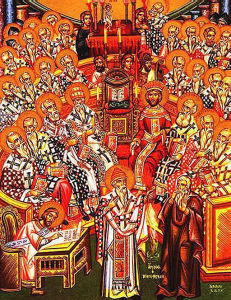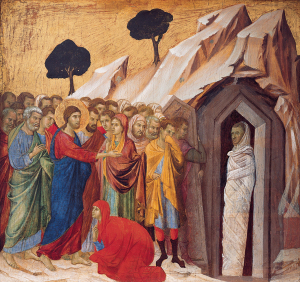A central and defining tenet of Christianity is that Jesus is more than just a good teacher or even a prophet; He is God incarnate. This fact is traceable to claims and evidences offered directly from Jesus himself. However, certain fringe academic circles such as the “Jesus Seminar” and popular authors like Dan Brown have popularized the idea that Jesus never claimed to be divine. They contend that this perception of Jesus was a product of much later “mythologizing,” and would have been roundly rejected by Jesus and early Christian followers.
A review of scripture and history tells a very different story. They clearly show that Jesus claimed divinity, his earliest disciples firmly believed and taught it, and there is much evidence, even from secular sources, to validate it. For purposes of this article, we will focus primarily on Jesus’ direct claims and evidences. The beliefs of early Christians regarding Jesus’ divinity will be more fully addressed in a subsequent article.
The Council of Nicaea
First, let’s dispel the myth popularized by Dan Brown’s The Da Vinci Code that Jesus was “deemed divine” by a relatively close vote at the Council of Nicaea (also spelled as “Nicea”) in 325 AD. Actually, the belief in Jesus’ divinity was fundamental to first century Christians and, as previously stated, is traceable to the claims of Jesus himself.
Secondly, the Council of Nicaea did not debate Jesus’ divinity. Rather, they debated the nature of his divinity. Specifically, they worked to determine whether Jesus was a divine being, created by God (sort of like an uber-angel) or a being who had always been: The uncreated Son of God, co-eternal and equal with God the Father. Either way, it was firmly accepted that he was a divine being.
Finally, the vote was anything but close. The council voted approximately 220 to 2 in favor of Jesus’ full equality with God. This decision was taken based on the Council’s consideration and interpretation of scripture. Dan Brown’s theory makes for compelling storytelling, but it is a complete fabrication.
New Testament Claims of Divinity
Our knowledge of Jesus’ claim to divinity is rooted in the New Testament. We often think of the Bible as one book. However, that is not true. The New Testament alone consists of twenty-seven separate books by at least eight different authors. These authors were eyewitnesses that were either Jesus’ apostles (John, Peter, Matthew, Paul) or family members (James, Jude), or students of apostles (Luke, Mark). Seven of these authors refer to Jesus’ divinity, often in multiple passages. Only James and Jude do not directly mention Jesus’ divinity, though they both refer to Jesus as “Lord,” which implies it. It’s clear that Jesus’ closest followers believed him to be of a divine nature.
It is generally accepted that all the books of the New Testament were written between about 50 A.D. and 95 A.D., with some scholars advocating for as early as 37-70 A.D. The fact that these books were written so early lends credibility to the claims of divinity, since there would have been other witnesses to Jesus’ ministry at that time that could have refuted them if necessary. In some of his letters, for example, Paul even makes this point.
The New Testament records many examples of Jesus directly claiming divinity. In John 10:30, written by the apostle John or his appointed scribe, Jesus is quoted as saying “I and the Father (God) are one.” Matthew 16:15-17 records Peter’s identification of Jesus as “the Christ, the son of the living God” and Jesus’ affirmation of that description. In Mark 14:61-64, while on trial before the Jewish Sanhedrin, Jesus claims to be the prophesied Christ. John 5:18 records how the Jews understood Jesus’ claims to be God’s son as being “equal with God” (and within the cultural context, that is exactly what Jesus was claiming). Jesus also claims the title of “I AM” (God’s formal name, given in Exodus 3:14) for himself in John 8:58.
In addition to his personal claims of being the Christ (Messiah), Jesus also claimed to fulfill Old Testament prophecies (e.g. Luke 4:21). The Old Testament contains dozens of prophecies about the coming Messiah, and some foretell that he would be God incarnate (e.g. Isaiah 9:6). Of all the people in history, Jesus is the only one that fulfills these predictions. Also, many of these prophecies, including his lineage, place of birth, and manner of death, were not things Jesus could have actively manipulated to ensure he fulfilled them. It is simply implausible to believe a man could have accurately fulfilled dozens of prophecies, made 400+ years before his birth, unless he was actually the Messiah sent by God.
Jesus makes repeated indirect claims to divinity when he accepts worship that is due only to God. Jesus’ apostles worshipped him after he calmed the sea in Matthew 14:33. His disciples again worshipped him after his resurrection in Matthew 28:17. A blind man worshipped Jesus after being healed in John 9:38. The apostle Thomas called him “my Lord and my God” in John 20:29. Clearly, these examples of accepting worship indicate that Jesus believed he was a divine being and not just a “good teacher.”
New Testament and Historical Evidence
Further evidence for Jesus’ claimed divinity is from the many miracles attributed to him. He is credited with walking on water (Matthew 14:25), feeding thousands of people (Matthew 14:13-21), healing numerous people (e.g. Mark 1:40-42), and even raising the dead (Luke 7:11-15) among many other miracles. Jesus also repeatedly claimed the power to forgive sins (e.g. Mark 2:5, Luke 7:48-49), which is something that only God can do, according to Judeo-Christian theology. To make that claim would have been viewed by contemporary Jews as blasphemous (unless it’s true).
Interestingly, even non-Christian sources, including the works of the first century historian Josephus and the Jewish Talmud, credit Jesus with performing amazing feats. These feats are often attributed to sorcery instead of divinity. However, these sources do not deny that such events occurred. Rather, they are events that the authors felt needed to be explained away.
The Most Critical Evidence: The Resurrection
The most compelling evidence for Jesus’ divinity is the resurrection. If Jesus was raised from the dead, the debate is over. Six of the New Testament writers directly mention Jesus’ resurrection. Jesus is described as having appeared to all of his apostles and others after his crucifixion. In fact, Paul records the appearance of Jesus to over 500 disciples in 1st Corinthians. This is a bold reference since Paul states to his audience that most of these witnesses are still alive at the time and can verify his claim.
Paul’s life and writings in particular gives substantial credibility to Jesus’ resurrection and divinity. Paul was originally an official persecutor of Christians, but became a committed apostle, and the most prolific New Testament author, after an encounter with the post-resurrection Jesus. The fact that Paul converted to Christianity after claiming to have met the risen Jesus, and was also martyred for it, is powerful evidence for the fact that Jesus did rise from the dead.
Interestingly, no Jewish or Roman leaders or historians from the first or second centuries contest the fact that Jesus’ tomb was empty. Rather, they claim Jesus’ disciples stole the body. But this is unlikely since guards were posted at the tomb to prevent this very occurrence.
Also, it is interesting to note that eleven of the twelve apostles (including Matthias that replaced Judas) were eventually martyred for their teachings about the risen Jesus. The one that wasn’t martyred (John) was exiled. These men were actual witnesses to Jesus’ life, teachings, miracles, and resurrection. If they had stolen the body, they would have known without a doubt that Jesus did not rise. The fact that all of them were persecuted, and not one of them recanted, says a tremendous amount about the reliability of their testimony. Many people have been martyred for their beliefs, but it is highly unlikely that every apostle would be martyred or persecuted for a belief they knew was false.
Teachings of the Early Church Regarding Jesus’ Divinity
Based on Jesus’ clear teachings, the earliest disciples also believed and taught that Jesus was divine. While this topic will be more fully discussed in a later article, a brief overview here is appropriate. There are numerous passages in the New Testament, by the apostles John, Peter, and Paul that corroborate this belief.
Examples include John 1:1-14, John 20:28, Colossians 1:15-19, Colossians 2:9, Titus 2:13, and 2 Peter 1:1. Another very interesting passage is Hebrews 1 where Jesus is described as the “exact representation” of God and “superior to the angels,” which both affirms his divinity and refutes the belief of some that Jesus was not God incarnate, but rather a type of “promoted angel.”
Some contend that Jesus was a great moral teacher, but not divine. However, this description simply cannot be accurate. The claim to be God must be a blasphemous lie, an extreme delusion, or the truth. As CS Lewis states, Jesus was either a “liar, lunatic, or Lord.” The idea of Jesus as a liar does not fit the evidence of his great moral teaching and unimpeachable character or that fact that He was crucified for teaching these supposed lies without recanting. The idea of Jesus as a lunatic does not fit the evidence either. Jesus is the most influential person in history and was able to attract thousands of followers during his life and literally billions after his death while speaking some of the most profound words and philosophies ever stated. That is hardly the profile of a lunatic. We are left with only one other choice.
The weight of historical evidence, from multiple sources, supports that Jesus claimed to be, and was, God incarnate. Since this is such an important doctrine, it deserves more attention than can be provided in such limited space. There are many great books written for a more in-depth study. A few excellent examples include “The Case for Christ” by Lee Strobel and “More than a Carpenter” and “The New Evidence that Demands a Verdict,” both by Josh McDowell. These resources, among others, fully describe the compelling evidence that Jesus was God incarnate and the promised Messiah.



